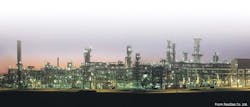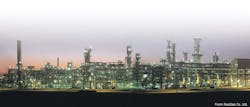RasGas wraps low-nitrogen oxide retrofit at Al Khaleej gas plant
RasGas Co. Ltd. has completed a decade-long program to cut emissions of nitrogen oxide (NOx) from a series of gas processing installations and related facilities at its LNG operations in Ras Laffan Industrial City, Qatar, north of Doha.
Implemented at RasGas LNG Trains 1-4, Phase 1 of the Al Kaleej Gas Project (AKG-1), and associated utilities, the low-NOx retrofit program has reduced the intensity of NOx emissions from the integrated LNG complex by about 90% from intensity levels at the site in 2006, RasGas said.
Executed in cooperation with Qatar’s Ministry of Municipality and Environment to respond to regulatory requirements for lowering emissions, the retrofit program involved implementation of GE’s proprietary dry low-NOx (DLN) combustion technology beginning in 2007 on the complex’s gas-fired turbines built before 2005.
Since its implementation, the DLN technology has ensured all applicable combustion units either meet or fall below Qatar’s applicable emissions limits, RasGas said.
The retrofit comes as part of a long-term maintenance agreement between RasGas and GE, under which a GE team is responsible for performing all maintenance of GE units at the complex (OGJ Online, Dec. 15, 2010).
Established in 2001 by Qatar Petroleum and ExxonMobil RasGas Inc. to handle gas reserves from Qatar’s North field 80 km offshore Ras Laffan, RasGas manages and operates seven LNG trains, two sales gas production facilities, two helium plants, as well as a long-term charter fleet of 27 LNG vessels (OGJ Online, Feb. 24, 2010).
LNG and sales gas capacities of RasGas’ operations at Ras Laffan include:
• LNG Train 1: 3.3 million tonnes/year.
• LNG Train 2: 3.3 million tpy.
• LNG Train 3: 4.7 million tpy.
• LNG Train 4: 4.7 million tpy.
• LNG Train 5: 4.7 million tpy.
• LNG Train 6: 7.8 million tpy.
• LNG Train 7: 7.8 million tpy.
• AKG-1: 750 MMcfd.
• AKG-2: 1,305 MMcfd.
Barzan gas project
RasGas also is managing construction of the previously delayed Barzan gas project, which now is nearing completion, the company said (OGJ Online, Apr. 10, 2009).
While South Korea’s Hyundai Heavy Industries Co. has concluded construction activities for Barzan’s offshore installations, Japan’s JGC Corp. is finalizing work on the project’s onshore facilities, which include the now-completed Train 1 and a nearly finished Train 2, RasGas said.
Once in operation, Barzan’s Trains 1 and 2 will supply about 2 bcfd of sales gas, most of which will be directed to the power and water sector.
RasGas, however, did not disclose a precise timeframe for Barzan’s commissioning.
Contact Robert Brelsford at [email protected].

